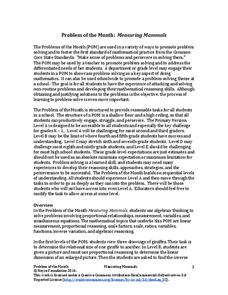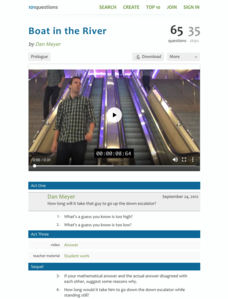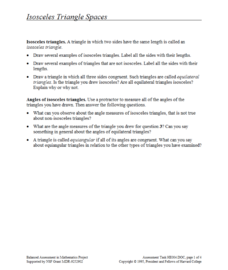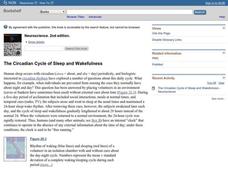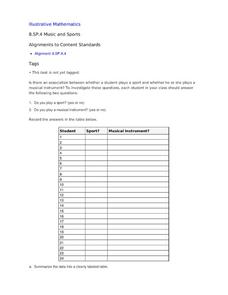CK-12 Foundation
Simple Random Sampling: How Many Samples Does it Take to Change a Light Bulb?
Teach the concept of simple random sampling through an interactive lesson. Learners explore the concept by considering the strength of sampling methods. Size of the samples varies also as individuals determine which methods lead to the...
Mathed Up!
Sequences
Explicitly talk to the class about sequences. A segment of a review series for the General Certificate of Secondary Education math assessment provides a review of arithmetic sequences. Pupils watch a video showing how to find terms given...
Mathed Up!
HCF, LCM, and Product of Primes
Give the class a prime example of using prime numbers. After reviewing prime factorization of numbers with the video, pupils use their knowledge to determine greatest common factors and least common multiples in the instructional...
Scholastic
Study Jams! Identify Outcomes and Make Predictions
Making predictions and identifying possible outcomes are skills that all science pupils should possess. In this video, Mia and Sam discuss the chances of puppies being male or female as an example. The animation is adorable, and will...
Willow Tree
Number Properties
The number of basic algebraic properties can become overwhelming for learners. A lesson plan explains and gives examples for all the basic algebraic properties. The resource is perfect to use as a way for pupils to...
Utah Education Network (UEN)
Analyze Proportional Relationships and Use Them to Solve Real-World Problems
What proportion of learners will benefit from the lessons on proportional reasoning? Class members learn about proportional relationships, from unit rates to writing equations for proportional relationships. Then, they learn to use...
Utah Education Network (UEN)
Geometric Figures and Scale Drawings
Scale up your lessons on geometry and ask learners to investigate conditions on triangles, scale drawings, the area and circumference of circles, and angle relationships. The resource includes activities and a homework assignment.
Noyce Foundation
On Balance
Investigate the world of unknown quantities with a creative set of five lessons that provides problem situations for varying grade levels. Each problem presents a scenario of fruit with different weights and a balance scale. Using the...
Noyce Foundation
Measuring Mammals
Explore the meaning of scale and proportion with a set of five activities that examines the topic from elementary through high school. The first lessons explore ratio by examining pictures of different sizes. The next three activities...
Beyond Benign
Drafting Bubbles
Let's start designing a house. Future architects create floor plans for a house given certain constraints. They calculate the area of each room in the house. This is the 11th lesson in a 15-part unit.
101 Questions
Dandy Candies
Package design is an economic necessity. Young scholars assume the role in an interesting inquiry-based lesson. Given 24 cubic shaped candies to package, they must determine the arrangement that uses the least amount of cardboard to...
101 Questions
Would You like Fries with Your Order?
Ever wonder what you are paying for a single fry at McDonald's? An engaging lesson compares the cost per fry in a small order to a larger order. It's a great application of unit rate that is sure to make your classes hungry for more!
101 Questions
Sticky Stickies
Don't let your classes get stuck on area calculations—grab their attention with an inquiry-based lesson! Scholars must develop a plan to determine how may sticky notes it takes to cover the surface of a door. They decide on the...
101 Questions
Boat in the River
Ever feel like you're headed up the down escalator? Don't let your pupils get stuck in that rut! Practice writing equations to solve a problem using an engaging lesson. A video presents information that allows learners to determine how...
101 Questions
Bean Counting
Don't spill the beans ... before the end of the lesson! Learners must predict how long it takes two people working together to fill a glass with beans. A video presents the rate it takes each person independently, and another video...
Concord Consortium
Center of Population
Let the resource take center stage in a lesson on population density. Scholars use provided historical data on the center of the US population to see how it shifted over time. They plot the data on a spreadsheet to look the speed of its...
Concord Consortium
Isosceles Triangle Spaces
How many different types of triangles can your class name? A discovery lesson guides learners through an exploration of the different triangle types and the relationships between their angles and sides. Using coordinate geometry,...
Illustrative Mathematics
Making Hot Cocoa, Variation 2
Learners are introduced to dividing by fractions in a visual way. Setting up groups from the information in the problem allows them to see what we divide and why. Use with the previous lesson, which can be found in Additional Materials,...
Illustrative Mathematics
Making Hot Cocoa, Variation 1
Dividing with fractions can be a confusing task to some, but the activity illustrates how to make groups out of the problem and look at it visually. Use this problem with the instructional activity in the Additional Materials section to...
Illustrative Mathematics
Art Class, Assessment Variation
Play with paint and decide the ratio to make different shades of green. When mixing paint colors, your painters should decide which ratios make the same shade and what is needed to mix other ratios for a different shade of green. This is...
Illustrative Mathematics
Buying Bananas, Assessment Version
Practice with unit rates, proportions, and ratios when Carlos purchases an amount of bananas. Learners must interpret a graph to decide whether points on the same line represent similar proportional relationships. Use with lesson plans...
Curated OER
Music and Sports
With so much talent in the classroom, do your musicians and athletes have related interests? This problem has your learners taking data from their classmates to decide whether there is an association between the two activities. The...
Curated OER
Rolling Twice
Rolling dice is the best way to show your learners how probability comes in to play. Although this activity does not specify an activity, your mathematicians can try this probability with real dice to calculate their experimental...
Illustrative Mathematics
Christina's Candies
Help Christina figure out how many chocolate and lemon candies she has with a lesson on decomposing numbers. When presenting this context to the class, the teacher chooses the total number of candies and the number that are chocolate,...
Other popular searches
- Multicultural Math Lessons
- Dr. Seuss Math Lessons
- Powerpoint Math Lessons
- Thanksgiving Math Lessons
- Esl Lessons Math
- Elementary Math Lessons
- Math Lessons Place Value
- Kindergarten Math Lessons
- 2nd Grade Math Lessons
- Math Lessons Pre Algebra
- Manipulatives Math Lessons
- Halloween Math Lessons








